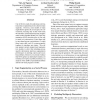602 search results - page 86 / 121 » Unsupervised Problem Decomposition Using Genetic Programming |
120
click to vote
GECCO
2005
Springer
15 years 7 months ago
2005
Springer
This study reports the work to date on the analysis of different methodologies for constant creation with the aim of applying the most advantageous method to the dynamic real wor...
126
Voted
CEC
2010
IEEE
14 years 5 months ago
2010
IEEE
— If a population of programs evolved not for a few hundred generations but for a few hundred thousand or more, could it generate more interesting behaviours and tackle more comp...
112
click to vote
TCS
2008
15 years 2 months ago
2008
The longest common subsequence(LCS) problem is one of the classical and wellstudied problems in computer science. The computation of the LCS is a frequent task in DNA sequence ana...
125
click to vote
GECCO
2010
Springer
15 years 2 months ago
2010
Springer
To complement standard fitness functions, we propose "Fitness Importance" (FI) as a novel meta-heuristic for online learning systems. We define FI and show how it can be...
145
click to vote
ACL
2012
13 years 4 months ago
2012
One of the key tasks for analyzing conversational data is segmenting it into coherent topic segments. However, most models of topic segmentation ignore the social aspect of conver...


